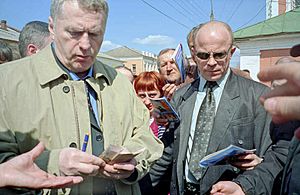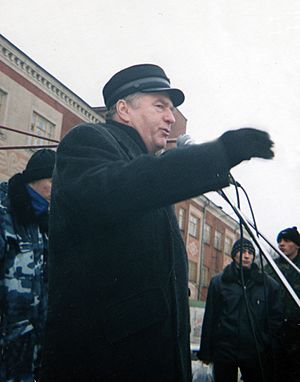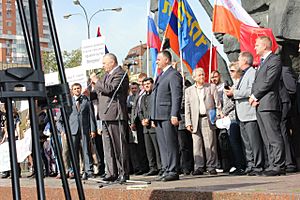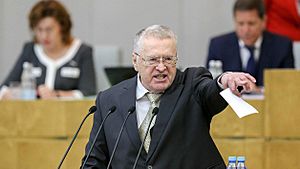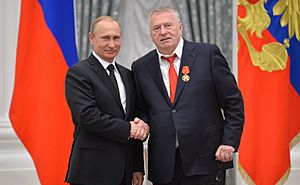Vladimir Zhirinovsky facts for kids
Quick facts for kids
Vladimir Zhirinovsky
|
|
|---|---|
|
Владимир Жириновский
|
|
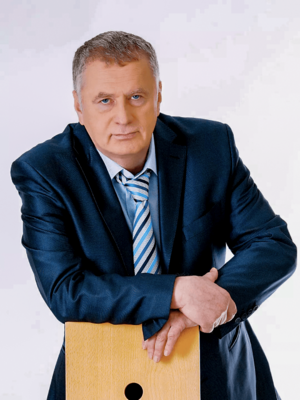
Official State Duma portrait
|
|
| Leader of the Liberal Democratic Party | |
| In office 18 April 1992 – 6 April 2022 |
|
| Succeeded by | Alexei Didenko (acting) Leonid Slutsky |
| Leader of Liberal Democratic Party group in the State Duma |
|
| In office 21 December 2011 – 6 April 2022 |
|
| Preceded by | Igor Lebedev |
| Succeeded by | Leonid Slutsky (acting) |
| In office 12 December 1993 – 18 January 2000 |
|
| Succeeded by | Igor Lebedev |
| Deputy Chairman of the State Duma | |
| In office 18 January 2000 – 21 December 2011 |
|
| Preceded by | Mikhail Gutseriyev |
| Succeeded by | Igor Lebedev |
| Member of the State Duma | |
| In office 12 December 1993 – 6 April 2022 |
|
| Constituency | Shchyolkovo (1993–95) Federal party list (1995–2022) |
| Leader of the Liberal Democratic Party of the Soviet Union | |
| In office April 1991 – 1992 |
|
| Personal details | |
| Born |
Vladimir Volfovich Eidelshtein
25 April 1946 Alma-Ata, Kazakh SSR, Soviet Union (now Almaty, Kazakhstan) |
| Died | 6 April 2022 (aged 75) Moscow, Russia |
| Resting place | Novodevichy Cemetery |
| Nationality | Russian |
| Political party | Liberal Democratic Party of Russia |
| Spouse |
Galina Lebedeva
(m. 1971) |
| Children | 3, including Igor Lebedev |
| Alma mater | Moscow State University |
| Occupation | Politician |
| Profession | Lawyer |
| Awards |
Order "For Merit to the Fatherland" (Russia, 2nd, 3rd, 4th class)
|
| Signature |  |
| Military service | |
| Allegiance | Soviet Union |
| Branch/service | Soviet Army |
| Years of service | 1970–1972 |
| Rank | Colonel |
Vladimir Volfovich Zhirinovsky (born April 25, 1946 – died April 6, 2022) was a well-known Russian politician. He led the Liberal Democratic Party of Russia (LDPR) from when it started in 1992 until he passed away. He was a member of the State Duma, which is like Russia's parliament, for many years. He also led the LDPR group in the Duma.
Zhirinovsky was a deputy chairman of the State Duma from 2000 to 2011. He also worked as a representative in the Parliamentary Assembly of the Council of Europe. He ran in almost every Russian presidential election during his lifetime. He was known for his strong opinions and for supporting Russia's military actions.
Contents
Vladimir Zhirinovsky's Early Life
Vladimir Zhirinovsky was born in Alma-Ata. This city was the capital of the Kazakh Soviet Socialist Republic then. Today, it is Almaty, Kazakhstan. His father, Volf Isaakovich Eidelshtein, was from Ukraine. His mother, Alexandra Pavlovna, was Russian. Zhirinovsky got his last name from his mother's first husband. His grandfather owned a large sawmill in Ukraine.
In 1964, Zhirinovsky moved to Moscow. He studied Turkish at Moscow State University and graduated in 1969. He also studied law and international relations. In the early 1970s, he served in the military in Tbilisi. He also worked for state groups and unions. In 1998, he earned a high degree in philosophy from Moscow State University.
Zhirinovsky was not very famous in Soviet politics during the 1980s. He tried to become a People's Deputy in 1989 but stopped quickly. In 1989, he was a director for a Jewish cultural group called Shalom.
His Family Background
Four of Zhirinovsky's relatives died during the Holocaust. His parents separated when he was a baby. His father moved to Israel in 1949. He worked there as a farmer. Zhirinovsky's father died in 1983.
Zhirinovsky did not know much about his father's life in Israel until much later. He said he was an Orthodox Christian. In 2001, he wrote about how his father changed his last name to Zhirinovsky. He once said, "Why should I reject Russian blood... and fall in love with the Jewish people only because of that single drop of blood that my father left in my mother's body?"
He later learned more about his father's life. He then said, "Journalists mocked me: for saying I was the son of a lawyer. And I am really the son of an agronomist." Zhirinovsky said he always looked for his father. He believed his father was alive and would find him. He met his Israeli relatives, an uncle and a cousin, later in life. They did not know he was a politician in Russia.
Founding the Liberal Democratic Party
In April 1991, Zhirinovsky helped start the Liberal Democratic Party of the Soviet Union. This was the second party officially registered in the Soviet Union. It was the first official opposition party. Some people believe this party was created with help from the Communist Party of the Soviet Union and the KGB.
Zhirinovsky first became well-known in June 1991. He came third in Russia's first presidential election. He received over six million votes. He made many promises to voters. For example, he once said that if he became president, everyone would get free vodka.
After the Soviet Union broke apart, the party changed its name to the Liberal Democratic Party of Russia. In 1992, Zhirinovsky met Jean-Marie Le Pen, a French political leader. Le Pen's party helped Zhirinovsky's party with things like computers. Zhirinovsky suggested creating a center for right-wing parties in Moscow.
The Liberal Democratic Party remained important in Russian politics. In the 1993 Duma elections, the LDPR received 23% of the votes. This was a lot of support across Russia. This encouraged Zhirinovsky to run for president again. He ran against the current president, Boris Yeltsin.
Many people outside Russia were worried about the rise of nationalist groups. They feared it could harm Russia's young democracy. Some thought Zhirinovsky's strong statements were just for getting votes. But in 1996, he was second in opinion polls for the presidential election. This worried many. In the end, he came in fifth place.
After 1996, the party's support became more stable. In the 2003 election, the LDPR got 11.7% of the votes. In 2004, Zhirinovsky did not run for president himself. He let someone else from his party run.
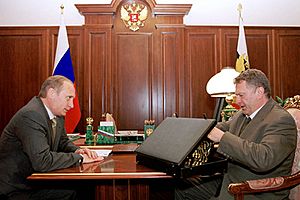
He ran in the 2000 and 2008 presidential elections. He promised a "police state" and quick punishments. A 1995 TV show showed him saying, "Help us, and you'll never have to vote again! ... these will be the last elections!"
During the 1990s, some people called Zhirinovsky a fascist. In 1994, he visited France. He said, "It's all over for you once you're Americanized and Zionized." He also threw things at protesters. A journalist from The New York Times said in 1994 that Zhirinovsky's party was "not liberal, not democratic, and these days not much of a party."
Zhirinovsky's Political Ideas
Zhirinovsky admired some American politicians. He once said that both the United States and Russia were "under occupation." He suggested setting aside places to send a "troublesome tribe." However, the American politician he mentioned strongly disagreed with this idea.
Some experts say Zhirinovsky had a "neo-Eurasianist" view. This means he believed Russia should have a strong influence over a large area, including parts of Asia and Europe. He worried about people from Turkey and the Caucasus region moving into Russian areas. He also wanted all Chinese and Japanese people to leave the Russian Far East. In 1992, he spoke in the United States. He called for protecting the "white race." He warned that white Americans might lose control of their country to Black and Hispanic people.
In 2004, Zhirinovsky spoke about a politician who was killed. He said that pro-Western democrats had only three paths: prison, the grave, or leaving the country.
In 2014, Zhirinovsky said Russia should get rid of political parties. He thought a leader chosen by "five to six thousand wisest people" would be better. He also suggested bringing back the old Imperial flag and anthem. In 2016, he proposed building a border wall and banning Muslims from entering Russia. This idea was similar to one by Donald Trump.
His Book: The Last Break Southward
In his 1995 book, The Last Break Southward, Zhirinovsky shared his ideas. He wrote about Russia expanding its influence southwards. He wanted Russia to reach the Indian Ocean and the Mediterranean Sea. He believed this would solve all of Russia's problems. He thought Russia would rule the area "from Kabul to Istanbul."
He also believed the United States would feel safer with Russia in charge of this region. He said wars would stop under Russian rule. He thought some people in Kabul, Tehran, or Ankara might not like it. But many others would feel better. He wanted "the bells of the Orthodox Church" to ring from the Mediterranean to the Indian Ocean. He also wanted the "Christian world" to reunite in Jerusalem.
He suggested moving some Palestinian people to parts of Turkey and Iran. He believed the Russian language and currency would unite people in the Near East and Central Asia. He imagined a world where different parts of the globe were controlled by different powers. Latin America would be in the American sphere. Africa would be in the European sphere. Japan and China would rule Southeast Asia, Indonesia, and Australia. He saw this as a logical way to organize the world. He believed it would bring peace and a "warm and clear political climate" to the planet.
He said Russia needed a leader with "planetary thinking." This leader would make sure the interests of most people on Earth were met. He believed this was Russia's destiny. He said Russia had no choice but to do it. He thought an "honest, perseverant, patriotically inspired President" could achieve this.
Views on Other Countries
Zhirinovsky often spoke boldly about other countries. He wanted to reunite former Soviet countries with Russia. He even wanted Russia to have its 1900 borders again, which included Finland and Poland. He suggested taking Alaska back from the United States. He also wanted to turn Kazakhstan into "Russia's back yard." He even proposed causing wars in former Soviet countries and then taking over what was left. Zhirinovsky supported separatism for Russians in the Baltic states. He wanted Russia to take over these countries again. He even said nuclear waste should be dumped there.
Zhirinovsky supported good relations between Israel and Russia. But he said Israel should make Russian its official language. He also thought Israel should pay more attention to the Russian Orthodox Church. He believed Russians in Israel needed protection from Russian police. Zhirinovsky led several official Russian visits to Israel. He said he was worried about the money situation for the many Russians living in Israel. He also stated that "Russia will never allow any violence against Israel."
In the early 1990s, Zhirinovsky suggested using large fans. These fans would blow radioactive waste from Russia into the Baltic states. To stop bird flu, he suggested giving guns to all Russians and soldiers. He wanted them to shoot down migrating birds returning to Russia.
In 1994, Zhirinovsky sued a Finnish politician for calling him a "madcap." The court in Finland found her not guilty. Also in the 1990s, Zhirinovsky threatened to remove limits on selling weapons to Iran. He also suggested selling the Kuril Islands to Japan for a lot of money.
In 1999, during the Second Chechen War, Zhirinovsky strongly supported the war. He suggested hitting some Chechen villages with small nuclear weapons. He also suggested using nuclear weapons and blocking ports if Russia went to war with Japan. In 2008, he suggested dropping nuclear bombs in the Atlantic Ocean. He thought this would cause a huge wave to flood Britain.
Zhirinovsky praised the "democratic process" in Iraq under Saddam Hussein. He strongly supported Saddam Hussein. He even sent armed volunteers to help Hussein during the Gulf War in 1991. He was also close to a Serbian nationalist leader.
In a 2002 video, Zhirinovsky spoke against a war in Iraq. He suggested striking other targets instead, with Russia's help. Zhirinovsky said he dreamed of a day when Russian soldiers could "wash their boots in the warm waters of the Indian Ocean." This would happen after Russia took over Afghanistan, Iran, and Turkey. He also said Bulgaria should take over Republic of Macedonia. He called Romania an artificial state.
Georgia, Russia's southern neighbor, was often a target of Zhirinovsky's words. After a leader in Georgia was removed in 2004, Zhirinovsky worried about similar events. He strongly supported the region of Abkhazia that broke away from Georgia. In 2004, a Georgian coast guard ship stopped his cruise ship.
Zhirinovsky was banned from Bulgaria for insulting its president. He was also not allowed to enter Germany. In 2005, Kazakhstan banned him. This was because of his controversial speech about changing the Russia-Kazakhstan border. In 2006, Ukraine also banned Zhirinovsky. This was after his comments about a gas dispute between Russia and Ukraine. His ban was lifted in 2007. He also made rude comments about a U.S. Secretary of State.
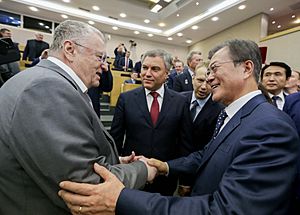
After a Russian defector died in London in 2006, Zhirinovsky said, "Any traitor must be eliminated." He said that if you work for special services, you should not betray secrets. In the 2007 Russian election, Zhirinovsky helped a suspect in the defector's death get elected to parliament. This gave him special protection. Zhirinovsky accused Great Britain of causing World War I, the Russian Revolution, World War II, and the breakup of the Soviet Union.
After war broke out between Russia and Georgia in 2008, Zhirinovsky wanted Russia to recognize the independence of Abkhazia and South Ossetia. He complained that Russia should have taken over all of Georgia. He wanted to arrest Georgian officers and their leader.
In 2009, Zhirinovsky said that Russians and Ukrainians are one people. He believed the enemy was from the West. In 2011, he spoke about a French politician. He said she was smart for saying France is a country that does not accept hundreds of thousands of Muslims practicing their traditions. He thought she had a chance to represent the French majority.
In 2013, when asked about a former Ukrainian prime minister, Zhirinovsky said, "Yulia Tymoshenko, I'm sorry, is a woman. I don't like them, as it's easier to persuade a woman. [...] Women are more compliant, and it's dangerous."
In 2014, after a meteor fell in Russia, Zhirinovsky claimed it was a test of a new American weapon. He also criticized Russian scientists for being too old. In April 2014, after Russia took over Crimea, Zhirinovsky suggested that McDonald's restaurants should be removed from Russia. In July, criminal charges were started against Zhirinovsky in Ukraine. This was for "financing actions aimed at changing the boundaries" of Ukraine. In August, Zhirinovsky threatened Poland and the Baltic states. He said they would be completely destroyed.
In May 2015, Zhirinovsky said a former Georgian president should be killed. He said, "We will shoot all of your governors... then they'll be afraid." He also said, "Let's aim at Berlin, Brussels, London, and Washington." He also said a Ukrainian political prisoner should be executed.
In November 2015, a Turkish jet shot down a Russian jet. Zhirinovsky then said Russia should drop a nuclear bomb on the Bosporus. He said this would create a huge wave to wipe out Istanbul.
In August 2016, Zhirinovsky hoped Donald Trump would win the U.S. presidential election. He thought Trump's opponent was dangerous. He also wanted to test his DNA to see if he and Trump were related. In September 2016, he again suggested building a border wall and banning Muslims from Russia. In October, he said voting for Hillary Clinton would lead to a "third World War." He believed Trump would be more peaceful.
In April 2017, Zhirinovsky promised to drink champagne if Donald Trump was removed from office. He said Trump was breaking his promises. After the 2021 United States Capitol attack, Zhirinovsky praised Trump. He tweeted, "Be brave Donald. We're with you, you'll get help from abroad."
On December 27, 2021, Zhirinovsky seemed to predict the date of the Russian invasion of Ukraine. He said, "At 4 a.m. on February 22, you will feel [our new policy]." He added, "It will not be peaceful. It will be a year when Russia becomes great again."
Zhirinovsky's Personal Life
Zhirinovsky married Galina Lebedeva, a lawyer, in the early 1970s. They had three children: two sons and a daughter.
Zhirinovsky could speak several languages. He was fluent in English, French, German, and Turkish.
His Illness and Death
In February 2022, Zhirinovsky was taken to a hospital in Moscow. He was in serious condition with COVID-19. In March, reports said he was put into a special sleep by doctors. He was being treated for problems from COVID-19, like infections and breathing issues. Zhirinovsky had said he was vaccinated against COVID-19 eight times.
On March 25, 2022, news spread that Zhirinovsky had died. Several sources, including his own political party, confirmed it. But his family quickly said it was not true. On April 6, 2022, Vyacheslav Volodin, the Speaker of the Duma, announced that Zhirinovsky had died after a long illness. He was 75 years old. After Zhirinovsky died, President Vladimir Putin said he "always defended his patriotic position and Russia's interests."
Zhirinovsky's funeral was led by Patriarch Kirill in Moscow. Many important politicians were there, including Putin and the Minister of Defence.
See also
 In Spanish: Vladímir Zhirinovski para niños
In Spanish: Vladímir Zhirinovski para niños
- Aleksandr Dugin
- Rashism
- Russian nationalism
 | Sharif Bey |
 | Hale Woodruff |
 | Richmond Barthé |
 | Purvis Young |


